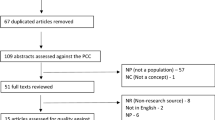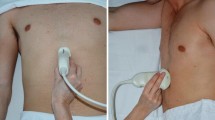Abstract
Introduction
Teaching point-of-care ultrasonography (PoCUS) to medical students is resource intensive. Peer-assisted learning, where the teacher can be a medical student, may be a feasible alternative to expert-led learning. The objective of this systematic review and meta-analysis was to compare the PoCUS performance assessments of medical students receiving peer-assisted vs expert-led learning.
Methods
This study was submitted to PROSPERO (CRD42023383915) and reported with PRISMA guidelines. MEDLINE, Embase, ERIC, Education Source, Scopus, and Web of Science were searched from inception to November 2022. Inclusion criteria were studies comparing peer-assisted vs expert-led PoCUS teaching for undergraduate medical students. The primary outcome was performance assessment of PoCUS skills. Two reviewers independently screened citations and extracted data. The Cochrane risk-of-bias tool for randomized trials was used to assess study quality. Studies were included in the meta-analysis if mean performance assessment scores with standard deviations and sample sizes were available. A random-effects meta-analysis was conducted to estimate the accuracy score of practical knowledge test for each group. A meta-regression evaluated difference in mean scores.
Results
The search yielded 2890 citations; 1417 unique citations remained after removing duplicates. Nine randomized-controlled studies conducted in Germany, USA, and Israel, with 593 participants, were included in the meta-analysis. The included studies assessed teaching of abdominal, cardiac, thoracic, musculoskeletal, and ocular PoCUS skills. Most studies had some risk-of-bias concerns. The estimate accuracy score after weighting is 0.56 (95% CI [0.47, 0.65]) for peer-assisted learning and 0.59 (95% CI [0.49, 0.69]) for expert-led learning. The regression coefficient estimate is 0.0281 (95% CI [− 0.1121, 0.1683]); P value is 0.69.
Conclusion
This meta-analysis found that peer-assisted learning was a reasonable alternative to expert-led learning for teaching PoCUS skills to medical students.
Résumé
Introduction
L'enseignement de l'échographie au point d’intervention (PoCUS) aux étudiants en médecine nécessite des ressources importantes. L'apprentissage assisté par les pairs, où l'enseignant peut être un étudiant en médecine, peut être une alternative possible à l'apprentissage dirigé par des experts. L'objectif de cette revue systématique et de cette méta-analyse était de comparer les évaluations de performance PoCUS d'étudiants en médecine bénéficiant d'un apprentissage assisté par des pairs par rapport à un apprentissage dirigé par des experts.
Méthodes
Cette étude a été soumise à PROSPERO (CRD42023383915) et rapportée selon les directives PRISMA. MEDLINE, Embase, ERIC, Education Source, Scopus et Web of Science ont été recherchés depuis leur création jusqu'en novembre 2022. Les critères d'inclusion étaient les études comparant l'enseignement du PoCUS assisté par des pairs à celui dirigé par des experts pour les étudiants en médecine de premier cycle. Le principal résultat était l’évaluation du rendement des compétences PoCUS. Deux évaluateurs ont indépendamment examiné les citations et extrait les données. L'outil Cochrane d'évaluation du risque de biais pour les essais randomisés a été utilisé pour évaluer la qualité des études. Les études ont été incluses dans la méta-analyse si les scores moyens d'évaluation des performances avec les écarts types et la taille des échantillons étaient disponibles. Une méta-analyse à effets aléatoires a été réalisée pour estimer le score de précision du test de connaissances pratiques pour chaque groupe. Une méta-régression a évalué la différence dans les scores moyens.
Résultats
La recherche a donné lieu à 2890 citations ; 1417 citations uniques ont été conservées après suppression des doublons. Neuf études contrôlées randomisées menées en Allemagne, aux États-Unis et en Israël, avec 593 participants, ont été incluses dans la méta-analyse. Les études incluses ont évalué l'enseignement des compétences PoCUS abdominales, cardiaques, thoraciques, musculo-squelettiques et oculaires. La plupart des études présentaient des risques de biais. Le score de précision estimé après pondération est de 0,56 (IC à 95 % : [0,47, 0,65]) pour l’apprentissage assisté par les pairs et de 0,59 (IC à 95 % : [0,49, 0,69]) pour l’apprentissage dirigé par des experts. L'estimation du coefficient de régression est de 0,0281 (IC à 95 % : [-0,1121, 0,1683]) ; la valeur P est de 0,69.
Conclusion
Cette méta-analyse a montré que l'apprentissage assisté par les pairs était une alternative raisonnable à l'apprentissage dirigé par des experts pour enseigner les compétences PoCUS aux étudiants en médecine.



Similar content being viewed by others
Data availability
No datasets were generated or analysed during the current study.
References
Gilbertson EA, Hatton ND, Ryan JJ. Point of care ultrasound: the next evolution of medical education. Ann Transl Med. 2020;8(14):846–846.
Díaz-Gómez JL, Mayo PH, Koenig SJ. Point-of-care ultrasonography. N Engl J Med. 2021;385(17):1593–602.
Wagner M, Barron KR, Dversdal R. Internal medicine point of care ultrasound: indicators it’s here to stay. J Gen Intern Med JGIM. 2019;34(10):1956–8.
Steinmetz P, Dobrescu O, Oleskevich S, Lewis J. Bedside ultrasound education in Canadian medical schools: a national survey. Can Med Educ J. 2016;7(1):e78-86.
Russell FM, Zakeri B, Herbert A, Ferre RM, Leiser A, Wallach PM. The state of point of care ultrasound training in undergraduate medical education: findings from a national survey. Acad Med. 2022;97(5):723–7.
Brierley C, Ellis L, Reid ER. Peer-assisted learning in medical education: a systematic review and meta-analysis. Med Educ. 2022;56(4):365–73.
Topping KJ. The effectiveness of peer tutoring in further and higher education. High Educ (Dordr). 1996;32(3):321–45.
Lockspeiser TM, O’Sullivan P, Teherani A, Muller J. Understanding the experience of being taught by peers: the value of social and cognitive congruence. Adv Health Sci Educ Theory Pract. 2008;13(3):361–72.
Olaussen A, Reddy P, Irvine S, Williams B. Peer-assisted learning: time for nomenclature clarification. Med Educ Online. 2016;21(1):30974–8.
Allikmets S, Vink JP. The benefits of peer-led teaching in medical education. Adv Med Educ Pract. 2016;7(1):329–30.
Shenoy A, Petersen KH. Peer Tutoring in Preclinical Medical Education: A Review of the Literature. Med Sci Educ. 2020;30(1):537–44.
House JB, Choe CH, Wourman HL, Berg KM, Fischer JP, Santen SA. Efficient and effective use of peer teaching for medical student simulation. West J Emerg Med. 2017;18(1):137–41.
Guraya SY, Abdalla ME. Determining the effectiveness of peer-assisted learning in medical education: a systematic review and meta-analysis. J Taibah Univ Med Sci. 2020;15(3):177–84.
Masava B, Nyoni CN, Botma Y. Scaffolding in Health Sciences Education Programmes: An Integrative Review. Med Sci Educ. 2023;33(1):255–73.
Van De Pol J, Volman M, Beishuizen J. Scaffolding in teacher-student interaction: a decade of research. Educ Psychol Rev. 2010;22:271–96.
Miller GE. The assessment of clinical skills/competence/performance. Acad Med. 1990;65(9 Suppl):S63–7.
Moher D, Shamseer L, Clarke M, Ghersi D, Liberati A, Petticrew M, et al. Preferred reporting items for systematic review and meta-analysis protocols (PRISMA-P) 2015 statement. Syst Rev. 2015;4(1):1.
Sterne JAC, Savović J, Page MJ, Elbers RG, Blencowe NS, Boutron I, et al. RoB 2: a revised tool for assessing risk of bias in randomised trials. BMJ (Online). 2019;366:l4898–l4898.
Kühl M, Wagner R, Bauder M, Fenik Y, Riessen R, Lammerding-Köppel M, et al. Student tutors for hands-on training in focused emergency echocardiography—a randomized controlled trial. BMC Med Educ. 2012;12(1):101.
Knobe M, Münker R, Sellei RM, Holschen M, Mooij SC, Schmidt-Rohlfing B, et al. Peer teaching: a randomised controlled trial using student-teachers to teach musculoskeletal ultrasound. Med Educ. 2010;44(2):148–55.
Rong K, Lee G, Herbst M. Effectiveness of near-peer versus faculty point-of-care ultrasound instruction to third-year medical students. POCUS J. 2022;7(2):239–44.
Ben-Sasson A, Lior Y, Krispel J, Rucham M, Liel-Cohen N, Fuchs L, et al. Peer-teaching cardiac ultrasound among medical students: a real option. PLoS ONE. 2019;14(3): e0212794.
Eimer C, Duschek M, Jung AE, Zick G, Caliebe A, Lindner M, et al. Video-based, student tutor- versus faculty staff-led ultrasound course for medical students—a prospective randomized study. BMC Med Educ. 2020;20(1):512.
Celebi N, Zwirner K, Lischner U, Bauder M, Ditthard K, Schürger S, et al. Student tutors are able to teach basic sonographic anatomy effectively—a prospective randomized controlled trial. Eur J Ultrasound. 2010;33(02):141–5.
Cremerius C, Gradl-Dietsch G, Beeres FJP, Link BC, Hitpaß L, Nebelung S, et al. Team-based learning for teaching musculoskeletal ultrasound skills: a prospective randomised trial. Eur J Trauma Emerg Surg. 2021;47(4):1189–99.
Szalai C, Shehada SE, Iancu S, Herbstreit F, Ruhparwar A, Brenner T, et al. Does the clinical experience of a tutor influence how students learn extended focused assessment with sonography for trauma: a randomized controlled trial. Med Teach. 2023;45(3):286–91.
Li JJ, Kim JJ, Young C, Nausheen F. Comparing the effectiveness and image quality of musculoskeletal ultrasound of first-year medical students after training by student tutors versus ultrasound instructors: a pilot study. Curēus (Palo Alto, CA). 2022;14(7):e26890–e26890.
Knobe M, Sellei R, Maus U, Mooij S, Gradl G, Sopka S, et al. Undergraduate curricular training in musculoskeletal ultrasound: the impact of preexisting anatomic knowledge. Z Orthop Unfall. 2010;148(06):685–90.
Hashim A, Tahir MJ, Ullah I, Asghar MS, Siddiqi H, Yousaf Z. The utility of point of care ultrasonography (POCUS). Ann Med Surg. 2021;71:102982–102982.
Bey TA, Hahn SA, Moecke H. The current state of hospital-based emergency medicine in Germany. Int J Emerg Med. 2008;1(4):273.
Sakr M, Wardrope J. Casualty, accident and emergency, or emergency medicine, the evolution. J Accid Emerg Med. 2000;17:314–9.
Hoffman R, Pohlemann T, Wippermann B. Management of blunt abdominal trauma using sonography. Unfallchirurg. 1989;92:471.
Olszynski P, Kim D, Chenkin J, Rang L. The core emergency ultrasound curriculum project: a report from the Curriculum Working Group of the CAEP Emergency Ultrasound Committee. CJEM. 2018;20(2):176–82.
Acknowledgements
The authors would like to thank Sarah Visintini, BA, MLIS, from the University of Ottawa Heart Institute for the peer review of the MEDLINE search strategy. The authors would also like to acknowledge Evan Sterling and Nicholas Dehler from the University of Ottawa Library for additional feedback on the search strategy and translations.
Funding
None.
Author information
Authors and Affiliations
Corresponding author
Ethics declarations
Conflict of interest
The authors have no conflicts of interest to declare.
Supplementary Information
Below is the link to the electronic supplementary material.
Rights and permissions
About this article
Cite this article
Bapuji, R., Eagles, D., Ferreira, N. et al. Comparison of peer-assisted learning with expert-led learning in medical school ultrasound education: a systematic review and meta-analysis. Can J Emerg Med 26, 188–197 (2024). https://doi.org/10.1007/s43678-024-00663-x
Received:
Accepted:
Published:
Issue Date:
DOI: https://doi.org/10.1007/s43678-024-00663-x




